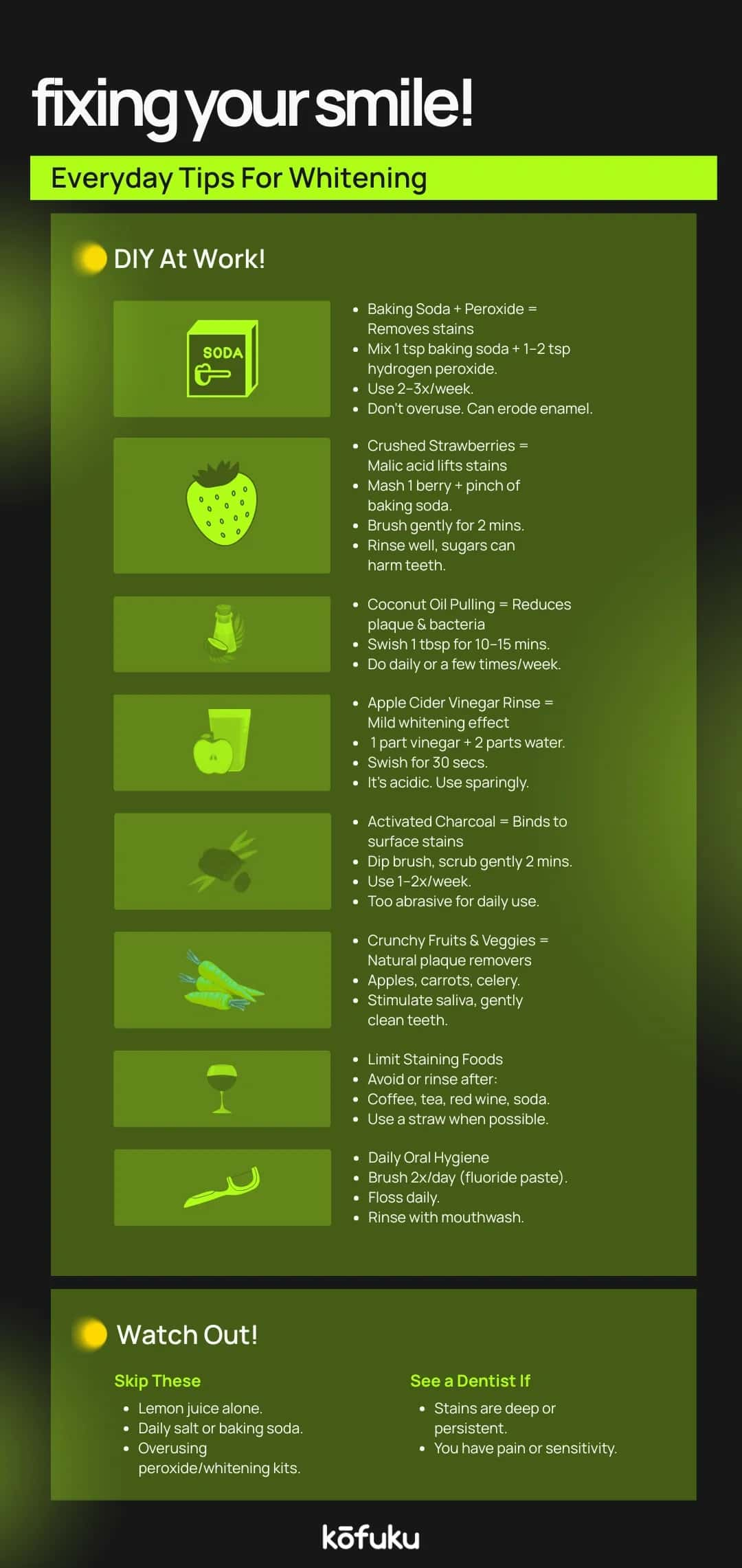How to Naturally Whiten Your Teeth at Home: Simple and Safe Ways

Introduction
There was once a brilliant ad in which a man was shown with a missing eyebrow and a few broken teeth, and all people noticed was his teeth, missing the eyebrow.
The point? People often notice your teeth first when you smile, and a bright, white smile is often perceived as a sign of good health and hygiene.
Professional teeth whitening treatments are often quick but can be expensive. Many people prefer to use natural, economical, and safer options in the comfort of their own homes, and in most cases, they work wonders.
This article will help you achieve whiter teeth naturally without any sensitivity issues or damage to the enamel.
The Natural Colour of Healthy Teeth
Before you look for ways to whiten your teeth, you need to consider what healthy teeth actually look like. Healthy teeth aren't as bright white as many people believe or as they’re shown on TV. The natural colour of teeth is typically an off white, slightly yellow, or light grey, because of the dentin beneath the enamel.
The colour of our teeth can also depend on several factors, including genetics, age, enamel thinning, and personal choices. Level of oral hygiene, smoking, use of tobacco products, and certain medications can also influence the colour of naturally healthy teeth.
Why Choose Dental Whitening at Home?
There are many advantages of choosing home dental whitening options:
- Cost: Home remedies and many over-the-counter treatment options are generally less expensive than other treatments available on the market.
- Time: You can whiten teeth whenever you want, and you don’t have to waste your time waiting to get an appointment at the clinic or spend long hours to get it done.
- Natural: You’re actually in charge of the ingredients you use if you go for home remedies, and most of them are natural. With this route, you can also avoid artificial or toxic products.

Top Home Remedies for Whitening Teeth
Baking soda and lemon paste (may not be safe for everyone)
One option that is widely used is paste made from mixing baking soda and lemon juice. The baking soda removes surface stains because it is mildly abrasive, and the citric acid from lemon juice helps with discoloured teeth.
However, regular use of this remedy can erode your enamel, so use it only once a week and rinse thoroughly afterwards.
1. Coconut Oil for Oil Pulling
Oil pulling is an old Ayurvedic tradition in which you swish one tablespoon of coconut oil in your mouth for 10–15 minutes. Oil pulling can enhance your oral health by reducing bacteria levels, decreasing plaque, and eventually lightening stains caused by some foods and drinks.
2. Activated Charcoal
Activated charcoal is highly absorbent and binds to tannins, the compounds in wine, coffee, and tea that cause teeth staining. Brushing gently with a bit of charcoal a few times a week can help reduce stains. Do not scrape too hard, as this can damage your enamel and increase teeth sensitivity.
3. Diluted Hydrogen Peroxide Solution
Hydrogen peroxide is a natural bleaching agent. Use 3% hydrogen peroxide and combine it with equal amounts of water and hold it in your mouth for 30 seconds. Do this a few times a week, but ensure that you don’t swallow the mixture.
You can also mix it with baking soda to create a mild toothpaste. Be cautious about this as overusing can cause damage.
4. Apple Cider Vinegar Rinse
ACV is antibacterial in nature and can dissolve plaque. However, it’s quite acidic and can erode your enamel if used every day. To safely use ACV for teeth whitening, dilute it with one part ACV to three parts water.
Don’t forget to rinse your mouth with water thoroughly afterwards.
Tips for Whitening Teeth at Home Without Damaging Them
5. Brushing after Eating
If you’re eating foods known for staining your teeth, such as berries, red wine, and coffee, then brushing your teeth within 30 minutes of consumption can help prevent stains from settling into your teeth.
If brushing your teeth isn't an option, then at least rinse your mouth out with water immediately.
6. Skip the Hard Brushing
Use a soft-bristled toothbrush and apply gentle pressure while brushing. Brushing aggressively can break down your enamel and cause your teeth to yellow more easily over time. If you have sensitive teeth, use toothpastes that target sensitivity.
If you’re concerned, consult your dentist.
7. Be consistent, but don’t overdo it
Teeth whitening takes some time with natural options, so you need patience when it comes to seeing your natural teeth whiten. However, you also need to be cautious about using too many home remedies too often on your teeth, as they can have negative consequences, especially those with acidic and abrasive components.
Limit yourself to 2-3 times a week for most of these treatments.
Understanding Sensitive Teeth and Whitening Challenges
Common Signs of Sensitive Teeth
If you experience pain or an electric sensation when you eat hot, cold, or sweet foods, you may have sensitive teeth.
Causes of sensitivity before and after Whitening
Whitening strips, acidic solutions, and aggressive brushing can wear down the enamel, causing tooth sensitivity by exposing nerve endings in sensitive teeth. Cavities and gum problems that existed before whitening could exacerbate the sensitivity.
The best toothpaste for sensitive teeth
Use toothpastes that contain fluoride, potassium nitrate, or arginine, as all of these are intended to block signals of pain while strengthening your enamel.

How to Maintain Whitened Teeth Long-Term
- Drink through a straw.
- Drinking soda, coffee, or tea from a straw helps reduce how much liquid comes into contact with your teeth, keeping them whiter for longer.
- Rinse after eating acidic foods.
- Eating fruits that contain citric acid, tomatoes, and anything vinegar-based will erode the enamel on your teeth. Rinse your mouth or chew some sugarless gum to neutralise the acid in your mouth.
- Brush regularly with the right toothpaste.
- Ensure that you brush your teeth at least twice a day with a non-abrasive fluoride toothpaste. Toothpaste designed for sensitive teeth can also help whiten your teeth.
How Much Does Professional Whitening Cost Compared to At-Home Whitening?
Professional in-office whitening can typically cost anywhere from ₹8,000 to ₹20,000, depending on the clinic and treatment. Meanwhile, natural home remedies or over-the-counter options, such as whitening toothpaste or strips, cost less, typically under ₹1,000, making them a much more feasible option.
However, the downside to this is that the results may take longer to appear.
Unusual Trends Related to Teeth Whitening
Why are people searching for ‘Colour Code on Toothpaste’?
This viral trend says that the colored squares on toothpaste tubes signify if they’re chemical or natural. Sorry to burst your bubble, but this is just a manufacturing label and not an indication of what is or isn't safe. Be sure to actually check the chemical components of toothpaste by reading the ingredient section.
Is ‘Stay Pure Bathroom Cleaner’ Really for Teeth?
This trend is a result of misinformation because no one should put bathroom cleaner in their mouths. It’s unhygienic and unsafe. So, never apply bathroom cleaner to your teeth or put it in your mouth to protect your health and safety. This cleaner contains a lot of toxic chemicals that are harmful to humans.
What’s 'Acid Fast Staining' got to do with teeth?
Acid-fast staining is a microbiology laboratory procedure used to identify specific bacteria, and it has no relevance to teeth whitening.
Conclusion
You can naturally brighten your smile if you’re patient and put in the effort, time, and proper care. Home remedies can work miracles, but only if they’re being used cautiously so that it doesn’t harm your enamel or increase sensitivity.
The colour of naturally healthy teeth may not be shiny white, and that's ok. Remember that being clean and confident is more important than perfection.

FAQs
Q. What is the fastest way to whiten teeth at home naturally?
A. No home remedies for teeth whitening give instant result. However, baking soda with hydrogen peroxide does act fast. But use it with caution to avoid damaging your enamel.
Q. Is toothpaste for sensitive teeth good for whitening?
A. Yes, some sensitivity toothpastes also contain safe whitening agents for long-term use.
Q. Can I use baking soda daily to whiten my teeth?
A. No, baking soda should not be used every day, as it can cause enamel erosion. Limit its use to 2-3 times a week.
Q. What is the real colour of healthy teeth?
A. Naturally healthy teeth tend to be off-white or slightly yellowish and never pure white.
Q. How can I remove yellow stains from my teeth at home?
A. Oil pulling, activated charcoal, and diluted hydrogen peroxide are some home remedies that you can safely use to remove stains from your teeth. But, make sure you don’t overdo it and are cautious with its use to protect your enamel.

Taking Care of Your Teeth Means Taking Care of Your Heart – A Deep Dive

Oral Cancer - Types, Symptoms, Causes, Treatment

10 Effective Ways to Reduce Stress

10 Common Signs of Anger Issues in Women

10 Monsoon Diseases You Should Be Aware of in India


